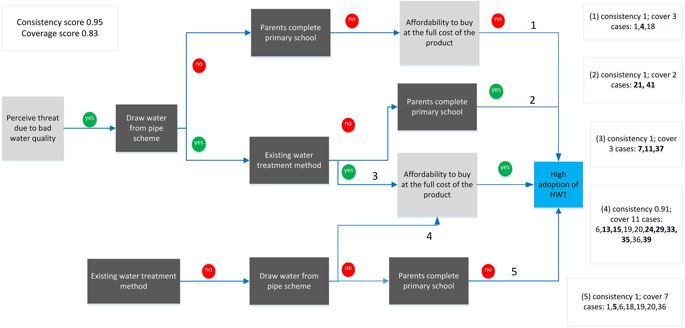npj Clean Water ( IF 11.4 ) Pub Date : 2018-07-23 , DOI: 10.1038/s41545-018-0012-z D. Daniel , Sara J. Marks , Saket Pande , Luuk Rietveld

|
Household water treatment (HWT) can effectively reduce exposure to unsafe drinking water at home. Understanding the characteristics of target groups who successfully adopt HWT, such as perception about water quality and usefulness of HWT, income, or parental education, is essential for enhancing the adoption of HWT in developing countries. The objective of this study is to analyze the interactions between such socio-environmental characteristics, rather than a single characteristic, in order to explain the adoption of HWT. Five socio-environmental characteristics and behavior determinants were analyzed using Qualitative Comparative Analysis (QCA) from 41 case studies in Africa, Asia, and South America. Results show that there is no single characteristic that alone explains the adoption of HWT. QCA identified five pathways leading to high adoption of HWT. Perceived threat due to bad water quality is a pre-condition for three of the pathways. However, perceived threat does not alone explain adoption of HWT and must be accompanied by other conditions. Households connected to piped water schemes can also be potential HWT adopters as long as they perceive poor tap water quality. Finally, households who are able to afford the full cost of HWT tend to adopt it only when they neither have prior experience with HWT nor a connection to a piped scheme. Our findings therefore highlight the necessity to analyze interactions between socio-environmental characteristics of households and behavior determinants in order to determine the adoption of HWT.


























 京公网安备 11010802027423号
京公网安备 11010802027423号